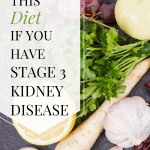The Importance Of Diet For Stage 3 Chronic Kidney Disease
If you or a loved one has been diagnosed with stage 3 Chronic Kidney disease, it's important to understand the importance of dietary restrictions in managing the condition.
With an appropriate renal diet, patients can slow down progression of kidney disease and even prevent further decline in their overall health, potentially avoiding more serious outcomes like needing dialysis or kidney transplant, which are usually recommended for those with End-Stage Kidney Disease.
Maintaining a balanced diet is an essential healthy lifestyle recommendation for living as comfortably and as healthily as possible with this chronic condition.
Stage 3 Kidney Disease Diet Restrictions
In this article, we'll explore why following a proper renal diet is so critical when managing Stage 3 Chronic Kidney Disease.
We’ll look at how different nutrients can affect your kidneys' function, what dietary changes are needed to keep them working optimally, and discuss some delicious meal ideas that will ensure you get all the nutrition you need while still enjoying great flavor!
Jump to:
- Stage 3 Kidney Disease Diet Restrictions
- Definition Of Stage 3 Chronic Kidney Disease
- The Role Of Diet In Treatment
- Nutrient Requirements
- Fluid Restrictions
- Sodium Intake Guidelines
- Potassium Intake Guidelines
- Protein Intake Guidelines
- Supplements To Consider
- Foods To Avoid
- Meal Planning Tips
- Stage 3 Chronic Kidney Disease Sample Diet
- Diet For Stage 3 Chronic Kidney Disease FAQs
- Diet Has a Key Role in Stage 3 CKD

Definition Of Stage 3 Chronic Kidney Disease
By definition, CKD is the presence of kidney damage, loss of kidney function, or decreased glomerular filtration rate (GFR) for three months or more, regardless of the cause.
Stages of Kidney Disease ranges from Stage 1 to Stage 5, with Stage 5 being the most severe: End-Stage Renal Disease. There are also renal diet restrictions by stage of CKD.
Stage 3 Chronic Kidney Disease is actually quite serious and can lead to severe health complications and disease progression if not managed properly. In order for someone with stage 3 CKD to manage their symptoms effectively, diet plays an important role in helping them maintain their kidney function levels.
Stage 3 Chronic Kidney Disease occurs when glomerular filtration rate (GFR), which measures how well your kidneys are functioning, falls below 60 milliliters per minute. At this point, waste starts to accumulate in the body due to declining renal function.
To help regulate these waste products as much as possible and minimize any further damage to the kidneys, making dietary changes is essential for those who have been diagnosed at this stage of the disease.
For More Recipes and Ideas --->> Get Your Free Meals and Recipes That Are Perfect for Pre-Dialysis Diets, Pre-Dialysis with Diabetes, or Dialysis Diets.
The Role Of Diet In Treatment
The dietary treatment for Stage 3 Chronic Kidney Disease is important in managing the condition.
A renal diet or also known as a kidney-friendly diet or simply kidney diet can help maintain healthy levels of potassium, phosphorus, and calcium in the body while also supporting a low salt intake.
Eating a balanced, nutritious diet can reduce symptoms such as nausea and fatigue that often accompany this stage of renal disease.
When planning meals, it's important to include foods like fruits and vegetables that are high in vitamins and minerals but low in sodium content. Lean proteins should be incorporated into your diet as well; fish, lean beef, poultry and beans provide essential protein without adding too much fat or cholesterol.
In addition to these foods, complex carbohydrates found in whole grains offer energy and fiber while helping to regulate blood sugar levels.
It's also important to pay attention to portion sizes when following a renal diet; eating smaller amounts more frequently throughout the day helps maintain your satiety. Working with a nutritionist or doctor will ensure you get all the necessary nutrients from food sources instead of relying mostly on supplements.
Additionally, adequate hydration is an essential factor for those living with Stage 3 Chronic Kidney Disease. Proper oral fluid intake depending on your individual needs can help maintain your bodily functions without undue strain on your kidneys.
Considering how diet affects patients at this stage of the disease, dietary changes can help many people effectively manage their kidney health and prevent further progression into more severe stages.
Nutrient Requirements
To ensure your best health even with Stage 3 CKD, you need to pay close attention to your mineral requirements, vitamin needs, and overall nutrient balance.
Here are some key ways you can maintain a balanced diet:
- Ensure adequate, but not excessive intake of essential minerals such as zinc, magnesium, potassium, calcium, phosphorus and iron.
- Ensure adequate ingestion of vitamins A, B1 (thiamine), B2 (riboflavin), C and D.
- Consume plenty of fresh fruits and vegetables for fiber and antioxidants.
- Balance protein consumption from both animal sources (e.g., lean meats) and plant sources (e.g., legumes).
By following these nutritional guidelines, you will be able to support your kidneys while still enjoying tasty meals that are both physically and mentally nourishing.
At this stage, it is still best to be guided by your dietitian in your diet regimen to keep your symptoms under control and to help prevent further decline in your kidney function.
Fluid Restrictions
For those living with Stage 3 Chronic Kidney Disease, it is important to understand the significance of fluid restrictions. Fluid intake must be limited in order for your body to function properly and to avoid the complications of excessive fluid retention.
It is advised to only drink water and other liquids listed within these categories throughout the day. Consuming extra fluid especially from restricted beverages could lead to complications such as dehydration, electrolyte imbalance, or even further damage to your kidneys.
Furthermore, limiting yourself to a maximum of two liters per day will help you maintain healthy hydration levels. This is the usual limit, but individuals are advised to stick to what their physician recommends based on their needs.
When it comes to managing Stage 3 Chronic Kidney Disease, reducing liquid consumption is key because excessive water intake can burden kidneys which have less capacity to regulate body fluid through the blood.
However, it’s also essential for patients to stay adequately hydrated by consuming no more than the daily recommended amount of fluids. By understanding proper fluid restriction guidelines and adhering to them on a regular basis, you can manage your condition effectively and ensure long-term health benefits.
Sodium Intake Guidelines
Having discussed the importance of fluid restrictions for Stage 3 Chronic Kidney Disease, it is now time to look at sodium intake guidelines.
As with any dietary change, avoiding excess sodium can be difficult in all stages of kidney disease, but is crucial in order to maintain proper health and prevent further complications. Following a low sodium kidney diet can be tough to get used to, but with the right tools, you can figure it out.
Sodium intake is a major component of managing Stage 3 Chronic Kidney Disease since it can cause unwanted fluid retention and increased blood pressure which puts a strain on your blood vessels.
It is important to understand that many food products contain sodium levels that are higher than what you might expect. Some foods contain more than others, so it's best to pay attention to food labels when shopping for groceries or eating out.
Foods high in sodium include processed meats such as bacon and ham, canned soups and vegetables, lunch meat, frozen dinners, condiments like soy sauce and ketchup, snacks such as chips and crackers, cheese spreads and dips.
It’s recommended that individuals with Stage 3 Chronic Kidney Disease limit their daily amounts of sodium consumption to under 2 grams per day. This means avoiding adding extra table salt during meal preparation by using salt substitutes herbs and spices instead.
Additionally, being mindful of food choices while dining out is essential since restaurant meals often contain higher levels of added salts compared to homemade meals.
Potassium Intake Guidelines
It is essential for individuals at the third stage of Kidney Disease to pay attention to their potassium intake. Too much or too little can be dangerous for renal patients, so following a specific set of guidelines is important.
Due to poor kidney function with limited to eliminate excess substances, potassium restriction is often the rule. You can review with your physician if you have elevated potassium levels in your blood and take more stringent restrictions based on your own needs.
Otherwise, it is important to eat a variety of foods and try to manage your levels of protein and sodium limitations first.
When it comes to avoiding extra potassium, the goal should be moderation:
- Avoid high potassium foods and look for low potassium recipes that are still flavorful and enjoyable
- Balance out your meals by incorporating more fresh vegetables
- Monitor your daily servings of dairy products carefully
By following these tips for a low potassium diet, you can ensure that you're getting an appropriate amount of potassium in each meal. Eating right will help keep levels balanced while also providing other key nutrients such as protein and fiber.
Plus, having a healthy diet gives you energy throughout the day and helps support overall health. Make sure to talk to your doctor about any questions or concerns regarding your renal diet.
Protein Intake Guidelines
Maintaining a balanced kidney diet is essential for those with Stage 3 Chronic Kidney Disease. A low-protein diet with protein requirements modestly restricted to 0.8 grams per kilogram may be helpful in reducing pressure in the kidney, slowing kidney function decline.
However, adequate protein intake is still necessary to avoid malnutrition. One ounce of animal protein foods like fish, chicken, turkey, beef or pork contains about 7 grams of protein.
Following the dietary guidelines for Stage 3 Chronic Kidney Disease can help ensure optimal health of the kidneys and reduce symptoms associated with this condition.
Additionally, it is important to limit consumption of processed meats such as bacon and sausage due to the high sodium content which can have an adverse effect on blood pressure and overall health.
Furthermore, eating leaner cuts of meat will provide more beneficial nutrients while limiting saturated fats.

Supplements To Consider
When it comes to Stage 3 Chronic Kidney Disease, supplements can be a great way to ensure that you are getting the nutrients your body needs. However, not all supplements are right for everyone and some may even cause harm if used improperly or in excess.
It is important to consult with your doctor before beginning any new supplement regimen so they can help determine which ones will provide maximum benefit while avoiding potential risks.
Kidney disease supplements such as omega-3 fatty acids (best omega-3 for kidney disease), vitamin B12, calcium citrate and selenium are typically recommended for individuals with stage 3 renal failure.
Omega-3s have anti-inflammatory properties that can reduce inflammation throughout the body, support heart health and aid in reducing risk of cardiovascular disease.
Vitamin B12 helps maintain healthy nerve cells and red blood cell production, which is especially important for those suffering from anemia due to chronic kidney failure.
Calcium citrate helps build strong bones and teeth by providing essential minerals needed for proper bone density and structure. Selenium boosts immunity and aids in repairing damaged tissues within the kidneys.
It's also helpful to take a daily multivitamin along with other nutrient specific vitamins like vitamin D3 or zinc depending on individual need. Speak with your healthcare provider about recommending additional supplements that would best suit your dietary limitations associated with Stage 3 Chronic Kidney Disease.
Foods To Avoid
Having discussed the importance of dietary supplements for Stage 3 Chronic Kidney Disease in the previous section, this one will now focus on what to avoid in preserving your kidney health.
To maintain a healthy and balanced renal diet during this time, it is important to limit certain foods that can be difficult for kidneys to process.
Eating too much processed or refined food such as white breads, white rice, pastas, cookies, premade meals, canned foods, and chips should be avoided. Sugar-sweetened beverages are also not recommended due to their high sugar content which can worsen conditions like diabetes by excessively raising blood sugar levels.
Instead, choose kidney-friendly options such as fresh fruits and vegetables, whole grains like quinoa or brown rice, lean sources of protein like poultry or fish and low fat dairy products. These foods provide essential vitamins and minerals while being easy on the kidneys.
Additionally, limiting amounts of salt in your diet will help keep your body hydrated without causing any undue strain. It may take some trial and error but eventually you will find the right balance of nutrients in delicious meals that work with your specific condition. You can learn how to season food without salt.
Meal Planning Tips
It's essential to have a meal plan when managing Stage 3 Chronic Kidney Disease. Proper dietary approaches tailored for someone with this condition should have adequate protein, low in sodium, potassium, and phosphorus, and balanced in carbohydrates. Check out this 7 day meal plan for kidney disease.
To make sure you're getting the proper nutrition from your meals, here are some meal-planning tips:
First of all, it's important to choose foods that are packed with vitamins and minerals. Fresh vegetables and fruits can provide plenty of nutrients while also helping you stay hydrated.
Focusing on lean proteins like fish or poultry will help meet your daily requirements of protein without consuming too much sodium or phosphorus. Whole grains such as oats, quinoa, or barley are also great sources of fiber and other essential vitamins and minerals.
When planning out your meals for the week ahead, focus on making dishes that contain multiple components at once. This means choosing recipes that feature a variety of ingredients rather than just one type of food item per dish.
Meal prepping is also an effective strategy - cook several servings of each component at once, so you can easily assemble complete meals throughout the week quickly with minimal effort. You can even get kidney diet meal prepping tips.
Additionally, there are lots of delicious frozen options available if cooking isn't feasible! Just be sure to check the nutrition label thoroughly.
Finally, don’t forget about snacks - having healthy bites between meals helps keep energy levels up during the day and keeps cravings away. With these simple yet effective renal diet strategies, anyone can create meal plans to fit their individual needs!

Stage 3 Chronic Kidney Disease Sample Diet
Breakfast
- Oatmeal with low-fat milk and fresh berries or tropical fruits
- A hard boiled egg
- A slice of whole wheat bread toast with butter
Lunch
Vegetable soup with lentils -A sliced apple -A side salad with olive oil and vinegar dressing
Dinner
Baked salmon with steamed vegetables -Brown rice -A side of sautéed spinach
Bedtime Snack
Low-fat greek yogurt for ckd patients with fresh fruit and a handful of nuts
Every person with Stage 3 Chronic Kidney Disease has different dietary needs based on factors such as age, weight and other medical conditions. Therefore it’s important to consult a doctor or renal nutritionist who can create a customized renal diet plan specifically designed for one's individual situation.
With careful monitoring and adherence to these guidelines from expert professionals - along with regular exercise - individuals living with this chronic condition can enjoy better overall health outcomes.
Diet For Stage 3 Chronic Kidney Disease FAQs
When it comes to prognosis for those with Stage 3 Chronic Kidney Disease, there are a variety of factors that can impact the future outlook. This includes lifestyle habits such as diet and exercise, as well as medical history and age.
It's important to remember that each individual case is unique and must be considered carefully before making any predictions about the long-term health outcome.
It is generally accepted that early detection and treatment of kidney disease plays an essential role in determining how good one’s prognosis will be.
Therefore, it is recommended that individuals at risk for this condition should get regular checkups from their doctor so any changes or worsening symptoms can be monitored closely.
Additionally, adhering to a healthy diet low in sodium and other unhealthy substances may help slow down the progression of the disease, allowing people living with Stage 3 Chronic Kidney Disease more time to prepare themselves mentally and physically for what lies ahead.
Making informed decisions regarding nutrition choices is just one aspect of managing life with Stage 3 Chronic Kidney Disease; working together with healthcare professionals to create an effective care plan tailored specifically to your needs should also be part of the overall strategy.
By paying attention to all aspects of care - including dietary planning - it is possible to improve your prognosis, even with Stage 3 Chronic Kidney Disease.
As this is a serious condition that requires close monitoring and medical supervision, it's important to be aware of the potential treatments and lifestyle changes that may help prevent the progression of the disease.
While conventional medicine is essential for managing this condition, some people prefer to supplement this with natural therapies such as diet modifications, herbal remedies, or supplements.
Fortunately, there are several natural remedies that can be used to treat symptoms associated with Stage 3 Chronic Kidney Disease.
This includes:
1. Eating an anti-inflammatory diet rich in whole foods such as fruits and vegetables
2. Drinking plenty of water throughout the day
3.Practicing stress management techniques like yoga or meditation
4.Exercising regularly under the guidance of a healthcare professional.
These strategies can potentially play an integral role in helping those with Stage 3 Chronic Kidney Disease manage their condition more effectively.
However, it is still important to adhere to the treatment regimen prescribed by your doctor, as natural remedies alone may not be enough for optimal management.
Ultimately, finding a balance between medication and natural remedies is key when it comes to successfully treating Stage 3 Chronic Kidney Disease.
Monitoring your renal diet is an important part of managing Stage 3 Chronic Kidney Disease. But it can be difficult to know the best approach for monitoring what you eat and drink when you have this condition. Fortunately, there are some tips that can help make diet monitoring easier and more effective.
Firstly, it's essential to understand what foods are nutritious and beneficial for people with Stage 3 Chronic Kidney Disease. Foods with high protein or phosphorus levels should generally be avoided, while fruits, vegetables, legumes and whole grains should be eaten regularly.
This dietary knowledge will help form a base of understanding as to which ingredients should go into meals and snacks throughout the day.
Secondly, creating meal plans ahead of time is a great way to ensure healthy eating habits are being developed over time. Meal planning allows someone with Stage 3 Chronic Kidney Disease to plan out their own food choices in advance so they know exactly what they'll be consuming each day without feeling overwhelmed by decisions at the last minute.
Additionally, prepping meals on days off work or school can save time later on during the week; plus it eliminates any temptation for unhealthy snacking!
Thirdly, keeping track of water intake is also important when monitoring a person's diet with Stage 3 Chronic Kidney Disease.
Since dehydration increases urea levels in blood tests associated with this condition, staying hydrated helps keep those levels low – therefore reducing potential complications from elevated urea levels down the line.
However, there is risk of fluid accumulation due to declining renal function, so it’s best to stay within the amount of fluid to consume per day approved by your doctor.
Furthermore, drinking herbal teas or other decaffeinated beverages instead of caffeinated drinks could further reduce potential health risks related to renal function. Is decaffeinated coffee bad for your kidneys?
Finally, having frequent check-ups with your doctor prevents long-term damage caused by inadequate nutrition management in people who suffer from Stage 3 Chronic Kidney Disease.
-Working closely with medical professionals ensures that individuals stay up-to-date on all necessary treatments and lifestyle changes needed to maintain optimal health outcomes
- Such as maintaining suitable weight through proper nutrition monitoring practices - thus avoiding any serious repercussions due to lack of care taken around dietary restrictions pertinent to their condition.
By following these steps towards successful diet monitoring for Stage 3 Chronic Kidney Disease:
-Understanding nutritionally beneficial foods
-Creating meal plans ahead of time
-Tracking fluid intake
-Consulting regularly with doctors
Patients will find themselves better equipped for monitoring their diets for their best health.
The answer is yes - there are several home kidney tests and kidney function tests which can help you keep track of your overall health.
Home kidney tests provide a convenient way to check the functionality of one’s kidneys without having to visit a medical facility. These tests measure the levels of creatinine and urea in the blood, two important indicators of proper kidney functioning.
Other common types of tests include urine protein strips, GFR lab tests, 24-hour urine collection, blood urea nitrogen, and serum electrolyte measurement.
Each type helps detect different signs or symptoms associated with impaired renal system performance such as excessive thirst, fatigue, changes in urination frequency, unexplained weight loss or gain, vomiting, and nausea.
By utilizing these various methods to check for abnormal levels of creatinine and urea in the blood or urine samples collected at home, individuals with Stage 3 Chronic Kidney Disease can easily monitor their own health and make informed decisions regarding their dietary choices or lifestyle habits.
Keeping an eye on one’s renal system may also help prevent further damage from occurring due to poor dieting practices or lack of adequate hydration.
Armed with this knowledge then people can take proactive steps towards improving their quality of life by making healthy changes that will benefit them both physically and mentally. You can even view this resource for kidney test results explained.
Yes, a balanced diet with plenty of fruits and vegetables is essential for people living with Stage 3 Chronic Kidney Disease. Eating the right food can help to keep your kidneys healthy and reduce further damage from occurring.
It's important to follow specific kidney nutrition guidelines in order to ensure your body gets all the nutrients it needs while at the same time avoiding consumption of foods that have high phosphorus levels, amounts of sodium, and potassium content.
When considering what type of food to eat when you have Stage 3 Chronic Kidney Disease, focus on fresh fruits and vegetables as they provide many vitamins and minerals without being too high in protein or fat.
Foods such as apples, oranges, leafy greens, carrots, squash, sweet potatoes, and white beans are great sources of antioxidants and other helpful compounds which can support kidney function.
However, it’s prudent to be wary of potassium levels for some of these plant-based foods. Additionally, eating low-sodium proteins such as lean meats like chicken breast or fish is recommended as these contain necessary amino acids but won't put extra strain on your kidneys.
Other healthy choices include whole grains like oats (oatmeal and kidney disease) and brown rice; legumes such as lentils; dairy products made from unsweetened almond milk; and nuts or nut butter for additional plant-based fats.
It’s also important to remember that everyone’s nutritional needs are different depending on their health status so be sure to consult a registered dietitian who specializes in stages 3 kidney disease nutrition guidelines before making any big changes to your diet plan.
With proper guidance from an expert in this field you can create a customized meal plan that fits your individual dietary requirements and helps you maintain optimal renal health throughout each stage of life.
To avoid mistakes and simplify meal planning, many Stage 3 Chronic Kidney Disease patients are taking advantage of the internet.
An option not available in years past was the purchase of pre-designed online meal plans, created by a registered dietitian complete with grocery list. This can eliminate a lot of errors and confusion in the grocery store.
Whatever option you choose, be sure to follow your diet carefully. Many of the complications resulting from Stage 3 Chronic Kidney Disease are actually caused by improper nutrition.
Experts advise against designing your own plan without professional assistance. You can also take a good look at this Comprehensive Healthy Renal Diet Grocery List Guide.
Whether you decide to take on the complications of the do-it-yourself diet plan, or take advantage of the simplicity of online plans - the input of a registered dietitian is crucial.
Following the plan to the letter is equally crucial. Just remember - your health is worth it and Stage 3 Chronic Kidney Disease is nothing to take lightly.
Diet Has a Key Role in Stage 3 CKD
It's important to remember that diet plays a vital role in managing Stage 3 Chronic Kidney Disease. Having the right dietary plan and monitoring your kidney health are essential elements for living with this condition.
Importantly, nutrition intervention should always be in conjunction with managing other risk factors such as maintaining a healthy weight, keeping blood sugar levels in check and taking your blood pressure medications. You can always speak to a renal dietician to get more advice on how to manage your diet with State 3 Chronic Kidney Disease.
Anyone with Stage 3 Chronic Kidney Disease can take control of their own well-being and start making healthy changes to their diet. By doing so, you'll not only improve your quality of life but also help protect yourself from further complications down the line.
As always, it's best to consult with your nephrologist (kidney doctor) to find out what kind of dietary guidelines will work best for you personally. Nevertheless, with the right diet, people with kidney disease can live their best life even at Stage 3.





















